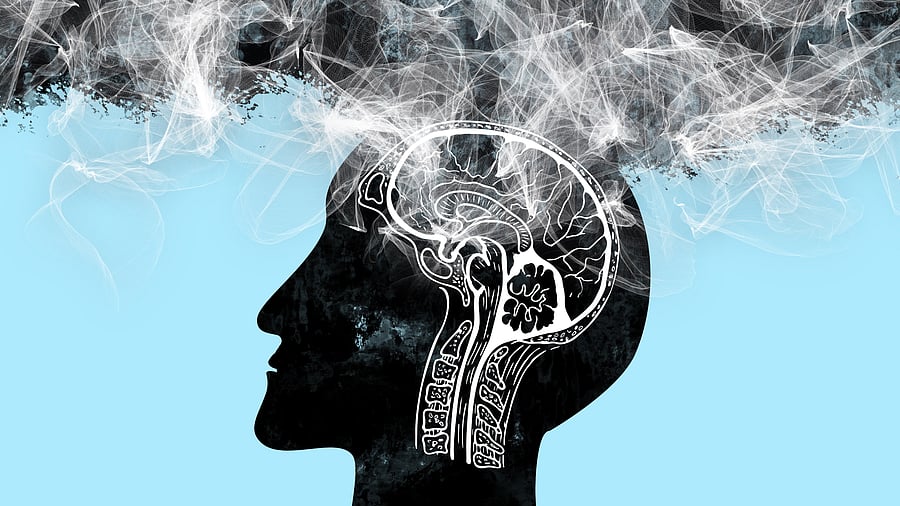
Image for representation.
Credit: iStock Photo
A mother couldn’t recognise her son who had cared for her for years. She gazed at him with vacant eyes, and the son felt as though he was losing her all over again. This is the reality of Alzheimer’s disease: the pain of losing one’s identity, the struggle to communicate, the loss of cherished memories, forgetting a loved one’s face, and becoming disoriented in familiar places. Alzheimer’s is often not discussed as a disease, yet it is increasingly affecting people around the world. The debilitating effects of this disease ravage cognitive functions, leaving a lasting impact on the lives of both patients and their loved ones. The disease is caused by the formation of amyloid plaques in the brain, which play a significant role in its onset.
Dr Manjari Tripathi, head of the Department of Neurology at AIIMS, Delhi, explained the disease, saying, “Alzheimer’s can be described as a steadily progressive condition in medical terms, where the symptoms of memory loss (i.e., dementia) gradually worsen over time. In the early stages, memory loss is followed by mild and moderate symptoms, culminating in the late stage, or ‘Alzheimer’s,’ when the individual loses the ability to carry on a conversation and respond to their environment, rendering them debilitated.”
“A range of therapies are available to address cognitive complaints in Alzheimer’s dementia,” Dr Tripathi continued. “As memory declines, medications such as donepezil and rivastigmine (cholinesterase inhibitors) may be used. In the moderate stages, memantine and galantamine are also options. Recently, the FDA has approved monoclonal antibodies like donanemab and lecanemab for Alzheimer’s treatment. However, these treatments are not yet available in India due to the requirement for advanced biomarker testing and nuclear imaging diagnostics,” she explained.
She further noted, “For biomarker-positive Alzheimer’s patients, treatment can be prohibitively expensive and may carry severe side effects, requiring careful supervision and monitoring.”
However, a promising study by scientists at the Jawaharlal Nehru Centre for Advanced Scientific Research (JNCASR) is focusing on novel disease mechanisms to advance the development of reliable detection and treatment options. This research holds the potential for significant breakthroughs in future diagnostic and therapeutic solutions. According to Professor T Govindaraju from JNCASR, “Current advancements have identified some potential blood and cerebrospinal fluid (CSF)-based biomarkers as reliable methods for diagnosis, along with brain imaging. Although amyloid (Aß)-targeting antibodies have shown promise in the disease’s early stages, they raise several concerns. Efforts are also underway to target tau pathology and other disease-associated mechanisms.”
Discussing recent advancements in Alzheimer’s research, he said, “Although the underlying mechanisms of the disease are not yet fully understood, there has been significant progress in elucidating its pathogenesis, facilitating advancements in detection and treatment. While protein misfolding and aggregation have been linked to neurodegeneration and cognitive decline, recent research has identified additional pathological pathways, such as ferroptosis, oxidative stress, and neuro-inflammation, which also contribute to the disease.”
Addressing the current challenges and future directions, Prof Govindaraju said, “While the progress so far is promising, further research is crucial to fully understand the long-term impact and effectiveness of these findings across diverse populations. Alzheimer’s is a multifactorial disease, involving multiple complex pathways. Future strategies must adopt multipronged and holistic approaches to address the condition.”
“Scientists at JNCASR are dedicated to developing novel strategies to achieve a comprehensive understanding and advancement of diagnostic and therapeutic approaches for multifactorial Alzheimer’s disease,” added Prof Govindaraju.
A molecular tool, VNIR-AD, and methods have been developed for the differential detection of Alzheimer’s disease, capable of distinguishing it from other neurodegenerative diseases such as Parkinson’s disease and tauopathies. This technology was developed at VNIR Biotechnologies Pvt Ltd. Additionally, a novel small molecule-based drug with significant potential for treating Alzheimer’s disease has been discovered. This drug addresses a broad population in both developing and developed countries. Following successful preclinical studies, the drug candidate (TGR63) has been licensed to a biopharmaceutical company for further clinical development.
Recently, a novel disease mechanism, the GPX4-Ferroptosis-Alzheimer’s Disease Axis, has been established, and a new polyphenolic natural product has been identified to combat dual toxicity in Alzheimer’s disease. This mechanism is expected to lead to improved therapeutics for the condition.
Some of the current research focuses on microglia and neuro-inflammation as universal pathological mechanisms for neurodegenerative disorders, particularly Alzheimer’s disease. Scientists at JNCASR are working to identify novel molecular markers as biomarkers and targets to manage Alzheimer’s disease more effectively, with findings to be disclosed in due course.
The healthy human brain contains billions of neurons — specialised cells that process and transmit information through electrical and chemical signals. These cells enable us to think, move, and function by sending messages to each other and to various parts of the body. Alzheimer’s disrupts these processes, impairing brain function as neurons fail to work properly and eventually die. While Alzheimer’s is a complex and multifaceted condition that affects not only individuals but also their loved ones, there is currently no permanent cure. Nevertheless, research continues to uncover new treatments and therapies. By staying informed, supporting those affected, and advocating for further research, we can improve the lives of those impacted by Alzheimer’s disease.